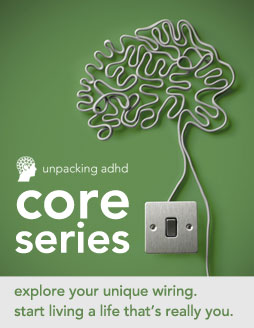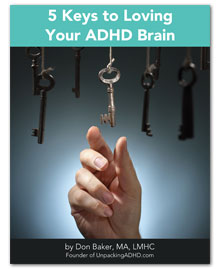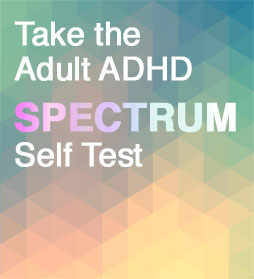Whether or not to try adult ADHD medication is a big question for many of my clients. It’s a very personal choice, but it’s also a choice that’s loaded.
Most adults come to the question of ADHD medication with strong leanings in one direction or the other. Some are looking for a quick fix with meds: “Just give me the drugs and I’ll be on my way!” Others are highly resistant. Some are nervous about side effects or generally distrustful of the pharmaceutical industry. Many want a natural solution.
I have no agenda. I support all my clients, whether or not they want to try meds. To help you cut through the confusion, I offer the following:
- Perspective on how meds fit in the bigger picture of ADHD treatment
- Scientific overview of how adult ADHD medication works
- Important caveats if you decide to try medication
- Stories from people who have benefited from medication, including myself
I welcome your thoughts! Please respond in the comments if you have direct experience or questions about ADHD medications. (Emotions can run hot on this topic, so please understand that I will only approve comments that are respectful of diverse perspectives.)
Brain Optimization – A Holistic Approach to ADHD Treatment
Your primary objective in learning to thrive with ADHD is to optimize your brain. Brain optimization is learning what your brain needs to perform at its best and bringing more of those things into your life.
As the definition suggests, brain optimization is a highly personalized process. Strategies fall into two main categories:
- Care and feeding of your physical brain. This is where medication can be a part of the solution, directly influencing brain functioning on a neurochemical level. Diet, sleep, exercise and meditation are also powerful ways to support and improve brain functioning.
- Managing and modulating your environment. By becoming a connoisseur of your attention and focus, you can learn to make better choices, control your level of stimulation, and otherwise navigate your ADHD traits more successfully. This is the core focus of my Seattle ADHD groups and the Unpacking ADHD Core Series.
Though not a complete cure, adult ADHD medication is helpful for many people. Research suggests that medications can significantly help with managing problematic traits for about 80% of people diagnosed with ADHD.
Here’s a great question to consider, from Dr. Edward Hallowell, author of the “ADHD bible” Driven to Distraction. Hallowell asks What Are the Side Effects of NOT Trying Medication? How much struggle are you enduring that medication might be able to relieve? Hallowell encourages people to take their time, do their research, and make the decision that’s right for them. But he also points out that trying medication is just that, a trial. It’s reversible. If it doesn’t help, your provider can help you adjust the dosage, try something else, or stop.
How Adult ADHD Medication Works
ADHD medications focus on specific neurotransmitters that behave differently in the brains of people with ADHD wiring. Medications support better communication within the brain in order to increase attention and alertness, improve impulse control, reduce hyperactivity, and otherwise relieve common ADHD challenges.
There are two types of ADHD medication:
- Stimulant. Stimulants such as Ritalin, Concerta, and Adderall are the most commonly prescribed type of ADHD medication. Stimulants target production and absorption of Dopamine, the neurotransmitter that plays a key role in motivation, movement, and emotional responses.
- Non-stimulant. These drugs tend to be used when people don’t respond well to stimulants, but they can also be taken in combination with stimulants. They focus on the production and absorption of Norepinephrine, a neurotransmitter related to executive functioning.
For a better understanding of how ADHD medications influence communication between neurons, I recommend the excellent graphics in How ADHD Medication Works.
Caveats for Trying Adult ADHD Medication
ADHD medications are complex and constantly evolving. Many physicians don’t know enough about ADHD to help you find the right balance of medications. For example, they might give you an antidepressant because they’re hesitant to prescribe a stimulant that could be more helpful.
Even ADHD specialists acknowledge that there are no easy answers as to what will work best for each individual.
“Translating ADHD medication theory into effective what-you-do-in-the office, step-by-step guidelines remains downright elusive. Even the most informed observer recognizes that no rule book exists that sets clear treatment options, clear objectives, and specific outcome measures.”
– Dr. Charles Parker, author of New ADHD Medication Rules.
Therefore, if you do decide to try medication, be sure to work with a clinical provider who really knows ADHD and is up-to-date on current prescriptions.
It’s very important take medications consistently at the same time(s) every day. Many people find it helpful to link meds to another part of their daily routine, such as making morning coffee. Setting alerts on your phone or getting support from a partner can also be useful.
Keep in mind that it may take time to get the right medication or mix of medications. You may experience side effects, such as sleep challenges or decreased appetite. Take detailed notes of any side effects you experience and share them with your provider.
When Adult ADHD Medications Work
Though not a complete cure, ADHD medications can have a significant impact on quality of life. My own first attempt to take medication didn’t work at all, but then when I tried medication again ten years later, it was amazingly helpful. It doesn’t fix all my challenges, but now I find myself doing stuff I hate to do!
Here are a couple recent reports from clients who have found medication helpful:
- “Getting started on things that historically have been tough for me is easier. For example, I have a disdain for paperwork. I’ve found that I’m more likely to start working through my stack of papers when I’m on my ADHD meds.”
- “Now that I’ve been on ADHD medication for a few months, I’m consciously aware that I lived with this huge amount of ‘fog’ — it’s the only way I can describe what it feels like. The contrast between my old “baseline” and new is remarkable! I honestly feel feel present, more in the moment.”
I hope this post has been helpful! And again, I’d love to hear your personal experiences or questions in the comments.
Don Baker, MA, LMHC
I’ve been leading groups for adults living with the traits of ADHD for more than 15 years. I am a licensed counselor in the state of Washington, and I received my own diagnosis of ADHD in 1997. I am passionate about sharing cutting edge information about ADHD wiring and helping people with ADHD connect with others in our “tribe.” I created the Unpacking ADHD Core Series, a flexible roadmap for adults with ADHD.





